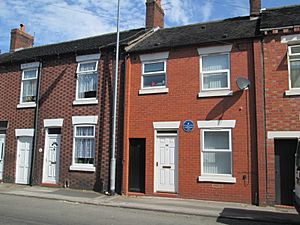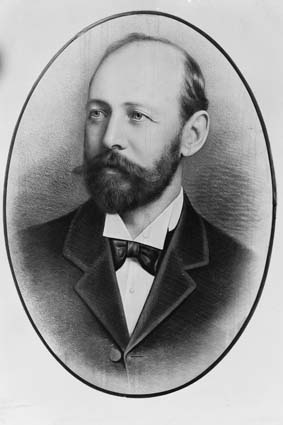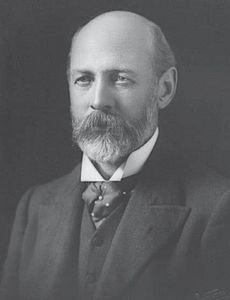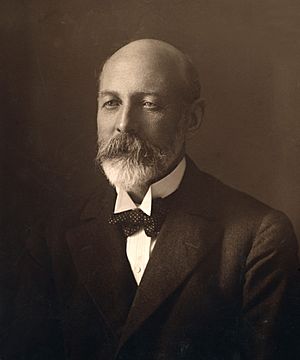Joseph Cook facts for kids
Quick facts for kids
Joseph Cook
|
|||||||||||||||||||||||||||||||||||||||||||
|---|---|---|---|---|---|---|---|---|---|---|---|---|---|---|---|---|---|---|---|---|---|---|---|---|---|---|---|---|---|---|---|---|---|---|---|---|---|---|---|---|---|---|---|
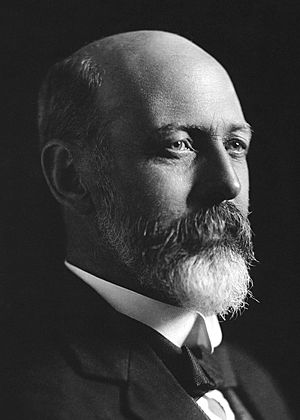
Cook, c. 1914
|
|||||||||||||||||||||||||||||||||||||||||||
| 6th Prime Minister of Australia | |||||||||||||||||||||||||||||||||||||||||||
| In office 24 June 1913 – 17 September 1914 |
|||||||||||||||||||||||||||||||||||||||||||
| Monarch | George V | ||||||||||||||||||||||||||||||||||||||||||
| Governor General | Lord Denman Sir Ronald Munro Ferguson |
||||||||||||||||||||||||||||||||||||||||||
| Preceded by | Andrew Fisher | ||||||||||||||||||||||||||||||||||||||||||
| Succeeded by | Andrew Fisher | ||||||||||||||||||||||||||||||||||||||||||
| 3rd Leader of the Opposition | |||||||||||||||||||||||||||||||||||||||||||
| In office 8 October 1914 – 17 February 1917 |
|||||||||||||||||||||||||||||||||||||||||||
| Prime Minister | Andrew Fisher Billy Hughes |
||||||||||||||||||||||||||||||||||||||||||
| Preceded by | Andrew Fisher | ||||||||||||||||||||||||||||||||||||||||||
| Succeeded by | Frank Tudor | ||||||||||||||||||||||||||||||||||||||||||
| In office 20 January 1913 – 24 June 1913 |
|||||||||||||||||||||||||||||||||||||||||||
| Prime Minister | Andrew Fisher | ||||||||||||||||||||||||||||||||||||||||||
| Preceded by | Alfred Deakin | ||||||||||||||||||||||||||||||||||||||||||
| Succeeded by | Andrew Fisher | ||||||||||||||||||||||||||||||||||||||||||
| In office 26 November 1908 – 26 May 1909 |
|||||||||||||||||||||||||||||||||||||||||||
| Prime Minister | Andrew Fisher | ||||||||||||||||||||||||||||||||||||||||||
| Preceded by | George Reid | ||||||||||||||||||||||||||||||||||||||||||
| Succeeded by | Alfred Deakin | ||||||||||||||||||||||||||||||||||||||||||
| Deputy Leader of the Opposition | |||||||||||||||||||||||||||||||||||||||||||
| In office 1 July 1910 – 20 January 1913 |
|||||||||||||||||||||||||||||||||||||||||||
| Leader | Alfred Deakin | ||||||||||||||||||||||||||||||||||||||||||
| Preceded by | Gregor McGregor | ||||||||||||||||||||||||||||||||||||||||||
| Succeeded by | John Forrest | ||||||||||||||||||||||||||||||||||||||||||
| In office 26 May 1909 – 2 June 1909 |
|||||||||||||||||||||||||||||||||||||||||||
| Leader | Alfred Deakin | ||||||||||||||||||||||||||||||||||||||||||
| Succeeded by | Gregor McGregor | ||||||||||||||||||||||||||||||||||||||||||
|
|||||||||||||||||||||||||||||||||||||||||||
|
|||||||||||||||||||||||||||||||||||||||||||
|
|||||||||||||||||||||||||||||||||||||||||||
| Personal details | |||||||||||||||||||||||||||||||||||||||||||
| Born |
Joseph Cooke
7 December 1860 Silverdale, Staffordshire, England |
||||||||||||||||||||||||||||||||||||||||||
| Died | 30 July 1947 (aged 86) Bellevue Hill, New South Wales, Australia |
||||||||||||||||||||||||||||||||||||||||||
| Resting place | Northern Suburbs Crematorium, Sydney | ||||||||||||||||||||||||||||||||||||||||||
| Political party | Labor (to 1894) Independent (1894) Free Trade (1894–1909) Commonwealth Liberal (1909–1917) Nationalist (after 1917) |
||||||||||||||||||||||||||||||||||||||||||
| Spouse |
Mary Turner
(m. 1885) |
||||||||||||||||||||||||||||||||||||||||||
| Children | George Sydney Cook Albert Cook Joseph William Cook John Hartley Cook Annette Margaret Cook Winifred Emmie Cook Richard Cecil Cook Constance Mary Cook Raymond Fletcher Cook |
||||||||||||||||||||||||||||||||||||||||||
| Parents |
|
||||||||||||||||||||||||||||||||||||||||||
| Occupation | Coal miner, trade unionist | ||||||||||||||||||||||||||||||||||||||||||
Sir Joseph Cook (born 7 December 1860, died 30 July 1947) was an important Australian politician. He served as the sixth Prime Minister of Australia from 1913 to 1914. He was also the leader of the Liberal Party and the Anti-Socialist Party.
Cook was born in England and started working in coal mines when he was just nine years old. He moved to Australia in 1885 and continued working as a miner. He became involved in the labour movement and was a union official. In 1891, he became one of the first members of the Labor Party to be elected to the New South Wales Legislative Assembly.
He later left the Labor Party due to disagreements and joined the Free Trade Party. In 1901, he was elected to the new Federal Parliament. He became a key leader in the anti-Labor parties, eventually leading the Anti-Socialist Party. In 1909, he helped merge his party with another to form the Commonwealth Liberal Party.
Cook became Prime Minister in 1913. His time in office was short and challenging because his party had a small majority in one part of parliament but not the other. He oversaw Australia's early involvement in World War I. After losing the 1914 election, he later joined forces with Billy Hughes to form the Nationalist Party. He served as a senior minister in Hughes's government, including as Treasurer.
After leaving politics, Cook served as Australia's representative in the United Kingdom from 1921 to 1927. He passed away at 86 years old, remembered as a significant figure in Australia's early political history.
Contents
Growing Up in England
Joseph Cook was born on 7 December 1860, in a small house in Silverdale, Staffordshire, England. He was the second of seven children. His family was poor and often struggled to afford food. His father worked as a coal miner.
When Joseph was nine, he left school to work in the coal mines. He earned very little money for long hours of work. His jobs included looking after the horses and cleaning mining tools. After a new law was passed, he was able to return to school for a short time.
In 1873, his father died in a mining accident. This meant Joseph, as the oldest son, had to become the main earner for his family. He went back to work in the mines. Despite his difficult start, Joseph was very determined to improve his life. He became a member of the Primitive Methodist Church and changed his last name from "Cooke" to "Cook".
In 1885, he married Mary Turner. Soon after, they decided to move to Australia for a new beginning.
Starting a New Life in Australia
Joseph and Mary Cook settled in Lithgow, Australia. Many other miners from their English hometown had also moved there. Joseph continued to work in the coal mines. He quickly became involved in the local miners' union, becoming the General-Secretary of the Western Miners Association in 1887.
He also supported ideas like free trade and was a founding member of the Labor Party in 1891.
Early Steps in Politics
In 1891, Joseph Cook was elected to the New South Wales Legislative Assembly. He represented the coal mining area of Hartley. This was a big moment for the Labor Party, as it was their first time winning a seat in any Australian parliament.
However, in 1894, Cook disagreed with the Labor Party's rule that all members had to follow party decisions. He believed in free trade, which went against some of Labor's ideas. He left the party and joined George Reid's Free Trade Party. Many Labor supporters saw this as a betrayal.
Cook became the Postmaster-General of New South Wales in 1894. In this role, he helped plan a special undersea cable to connect Australia to North America. This project showed his interest in connecting the Australian colonies, which was important for the future of Australia as a nation.
Joining the Federal Parliament
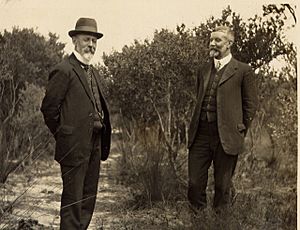
In 1901, Australia became a federation, meaning the different colonies joined together to form one country. Joseph Cook was elected to the new Federal Parliament for the area of Division of Parramatta. He won by a large number of votes.
In the new parliament, Cook became known for his skill in political debates. He was always ready to speak and argue his points. He became the deputy leader of the Free Trade Party, which was later called the Anti-Socialist Party.
By 1904, Cook strongly opposed socialism. He changed some of his earlier views to fit with his new party. He believed in personal freedom, which he linked to his Methodist faith.
In 1908, Cook took over from George Reid as the leader of the Anti-Socialist Party. He then agreed to merge his party with Alfred Deakin's Protectionist Party. This created a new, larger party called the Commonwealth Liberal Party, also known as "the Fusion." This was the first time anti-Labor parties had united. Cook became the deputy leader, and Deakin became Prime Minister again. Cook served as Defence Minister until the government lost the 1910 election.
Becoming Prime Minister
In January 1913, Joseph Cook became the leader of the Liberal Party. A few months later, at the 1913 election, his party won by just one seat against Andrew Fisher's Labor Party. This meant Cook became the sixth Prime Minister of Australia.
However, the Labor Party still had more members in the Australian Senate. This made it very hard for Cook's government to pass new laws. To fix this, Cook decided to use a special rule in the Constitution of Australia called a "double dissolution." This allowed him to call an early election for both parts of parliament.
He proposed a bill that he knew the Senate would reject. This gave him the reason he needed for the double dissolution. The new election was set for September 1914.
Australia and World War I
Just as the election campaign was happening, World War I began. On 30 July 1914, Cook was told that Britain might declare war. He quickly announced that if Britain was at war, Australia would be too.
His government offered to send 20,000 soldiers to help Britain. This offer was made even before Britain officially declared war. Australia's offer, along with those from Canada and New Zealand, may have encouraged Britain to join the war. Cook then approved the creation of the Australian Imperial Force. This force went on to capture German New Guinea within a few months. Cook was Prime Minister for the first six weeks of Australia's involvement in the war.
At the September 1914 election, Cook's Liberal Party lost. Andrew Fisher and the Labor Party returned to power.
Working with Billy Hughes
After Andrew Fisher left parliament in 1915, Billy Hughes became the new Labor leader and Prime Minister. In 1916, Hughes wanted to introduce conscription, which means forcing people to join the military. This caused a big split in the Labor Party.
Joseph Cook and his Liberal Party supported Hughes. Later in 1916, Hughes's supporters from Labor joined with Cook's Liberals to form the Nationalist Party. Even though many former Liberals were in the new party, Hughes became its leader, and Cook became the deputy leader.
Cook served as Minister for the Navy (1917–1920) and Treasurer (1920–1921) in Hughes's government. He was like the de facto Deputy Prime Minister. The Nationalists won big victories in the 1917 and 1919 elections.
Representing Australia Overseas
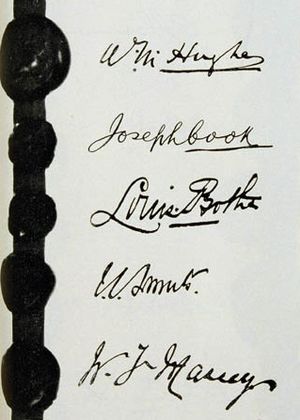
In 1918, Cook and Hughes went to London for the Imperial War Conference. Cook also visited the Western Front, where the war was being fought. He saw Australian Army camps and met with important military leaders. He even visited his old hometown in England.
Cook was one of Australia's representatives at the Paris Peace Conference in 1919. This conference decided the terms of peace after World War I. Australia, along with other British Dominions, signed the Treaty of Versailles separately. This showed that Australia was becoming more independent.
Cook was chosen to help decide the borders of Czechoslovakia. He didn't know much about European geography, but he supported making Czechoslovakia larger for security reasons. He and Hughes signed the Treaty of Versailles for Australia on 23 June 1919. Cook believed Germany needed to be punished but thought some parts of the treaty were too harsh. He strongly supported creating the League of Nations, an organization to promote world peace.
Serving as Treasurer
In 1920, Joseph Cook became the Treasurer, which is like the finance minister. He was in charge of the country's money. He faced challenges like high prices and unemployment after the war. Cook believed in limiting government spending and keeping taxes low. He presented two budgets during his time as Treasurer.
One important thing he did was to give the Commonwealth Bank of Australia the job of printing banknotes. This helped the bank become a more important national bank. Cook's last months in parliament were spent as Acting Prime Minister while Hughes was overseas. In November 1921, it was announced that Cook would become Australia's High Commissioner to the United Kingdom.
Australia's Representative in London
Cook arrived in London in January 1922 to begin his new role. His main jobs were to encourage people to move to Australia, attract investments, and boost trade. He also helped organize the Australian display at the British Empire Exhibition in 1924.
He represented Australia at international meetings like the International Labour Conference and the League of Nations. At the League of Nations, he answered questions about how Australia was managing its territories, Nauru and New Guinea.
Cook also made changes to how Australia House (Australia's office in London) was run, making it more efficient. He enjoyed the social side of his job, attending royal weddings and funerals. He was known for being friendly and easy to talk to. His term as High Commissioner ended in August 1927.
Later Life and Legacy
After returning to Sydney in 1927, Cook bought a large house overlooking Sydney Harbour. He later built an apartment block there and lived in one of the flats. In 1928, he led a special investigation into the finances of South Australia. His report suggested that South Australia should receive money from the federal government because federal policies had put it at a disadvantage.
Cook lived a quiet retirement. He didn't write his memoirs and even destroyed many of his personal papers. He spoke out during the Sudeten Crisis and after the German invasion of Poland, defending the Treaty of Versailles and blaming Germany for the new war.
Joseph Cook passed away at his home on 30 July 1947, at the age of 86. He was given a state funeral. He was the longest-lived Prime Minister for many years, a record later broken by Billy Hughes.
Honours and Recognition
- Cook was made a member of the Privy Council in 1914.
- He received a knighthood in 1918, becoming a Knight Grand Cross of the Order of St Michael and St George (GCMG).
- In 1972, Australia Post released a postage stamp with his picture on it.
- There is a federal election area called the Division of Cook, but it is named after Captain James Cook. In 2006, there was a suggestion to name it after both Joseph and James Cook, but this has not happened. Joseph Cook is the only eligible Prime Minister who does not have a federal electorate named after him.
See also
 In Spanish: Joseph Cook para niños
In Spanish: Joseph Cook para niños
- Cook Ministry


